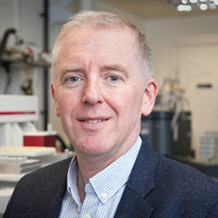Professor Ian A Graham FRS
Weston Chair of Biochemical Genetics
Research
Ian Graham’s interests include how plants make and breakdown various metabolites, how these processes are controlled and how they impact on plant growth. He has used biochemical genetics to dissect the main metabolic pathways controlling oil mobilisation in Arabidopsis seed (Graham, 2008). Similar approaches were used to understand and modify fatty acid composition of industrial hemp oilseeds (Bielecka et al 2014), resulting in UK registration in 2021 of CNAP1HOH as a dual purpose, high oleic acid variety that produces seed and biomass (shiv and fibre). The novel high oleic acid seed oil trait is five times more stable than conventional hemp seed oil at 20°C, offering new functionality and opportunity to the food processing industry.
The Graham lab also works on the genetic improvement of some of the world’s major medicinal crops. Characterisation and genetic mapping of traits responsible for production of the 15-carbon sesquiterpene artemisinin in Artemisia annua (Graham et al., 2010) has enabled development of F1 hybrid seed that can deliver a robust source of this vital anti-malarial drug for the developing world. Molecular genetic dissection of the key steps in artemisinin production has revealed new insight into the flexibility of sesquiterpene metabolism in glandular secretory trichomes (Czechowski et al., 2016) and genome assembly provides new knowledge and tools for improved production of artemisinin (Liao et al., 2022).
The 20-carbon diterpenoids represent another major terpenoid class with proven functionality across a range of industrial sectors. The Graham lab has led on the elucidation of the casbene-derived diterpenoid biosynthetic pathway from Euphorbiaceae species with discovery of the jolkinol C (lathyrane) biosynthetic gene cluster (King et al., 2014; King et al, 2016) opening up new opportunities to extend the pathway engineering to bioactive jatrophanes, ingenanes, tiglianes (phorbol esters) and other polycyclic diterpenoids. Development of Euphorbia peplus as a model species for biochemical genetic elucidation of casbene derived jatrophane and ingenane biosynthesis is providing new insight and gene tools for engineering the production of important medicinal compounds in heterologous hosts (Czechowski et al., 2022).
Another very important class of plant natural products are the alkaloids. The discovery in the Graham lab of a 10 gene cluster responsible for the production of the anti-tussive alkaloid compound noscapine in opium poppy provided the tools for molecular breeding of new commercial varieties (Winzer et al., 2012). The discovery of a novel P450 – oxidoreductase gene fusion described the last unknown step in synthesis of morphine and codeine (Winzer et al., 2015) and the first assembly of the opium poppy genome provided new insight into the evolution of morphinan production in this important medicinal crop (Guo et al., 2018). Evolutionary analysis of related Papaver species has identified when key events resulting in production of morphinans occurred and also uncovered novel related molecules (Catania et al., 2022).
Current projects
- Molecular breeding of a commercial pharmaceutical crop
Funding body: Sun Pharmaceutical Industries Pty Ltd
- Centre for High Carbon Capture Cropping (CHCx3)
Funding body: Defra, in partnership with Innovate UK
- High Value Biorenewables (HVB) network
Funding body: UKRI BBSRC
- Bioactive terpenoids as high performance ingredients for industry
Funding body: UKRI BBSRC Prosperity Partnership Award with Croda
Teaching and Scholarship
![]()
My teaching and scholarship activities mostly rely on examples from my own research to communicate the importance of asking the right questions in order to advance our understanding of biochemical processes. I emphasise the importance of fundamental understanding of how plants and microbes produce various chemicals and materials so that biotechnology based approaches can be used for the benefit of industry, society and the environment.
![]()
Higher plants produce an amazing array of chemicals that they use throughout their life cycle for various purposes including defence against pathogens and herbivores and attraction of pollinators. Many of these chemicals are bioactive and human societies have developed them for many uses including medicines, flavours and fragrances. My lectures focus on understanding how some of the world’s most important medicinal plants make drugs such as artemisinin, the main cure for malaria and codeine, one of the most effective painkillers. The use of genetic approaches to dissect biochemical processes is introduced and the potential of synthetic biology and industrial biotechnology are considered with examples from my own research and the literature.
![]()
Projects offered are always related to ongoing biochemistry and molecular genetics based research in the Graham laboratory. Bioinformatics plays a major role in assisting our research and we are currently offering projects that are focussed on analysing genome assemblies from medicinal plant species using various algorithms that allow novel gene discovery and gene cluster detection.

Contact details
https://www.bioyorkshire.co.uk
Centre for Novel Agricultural Products

